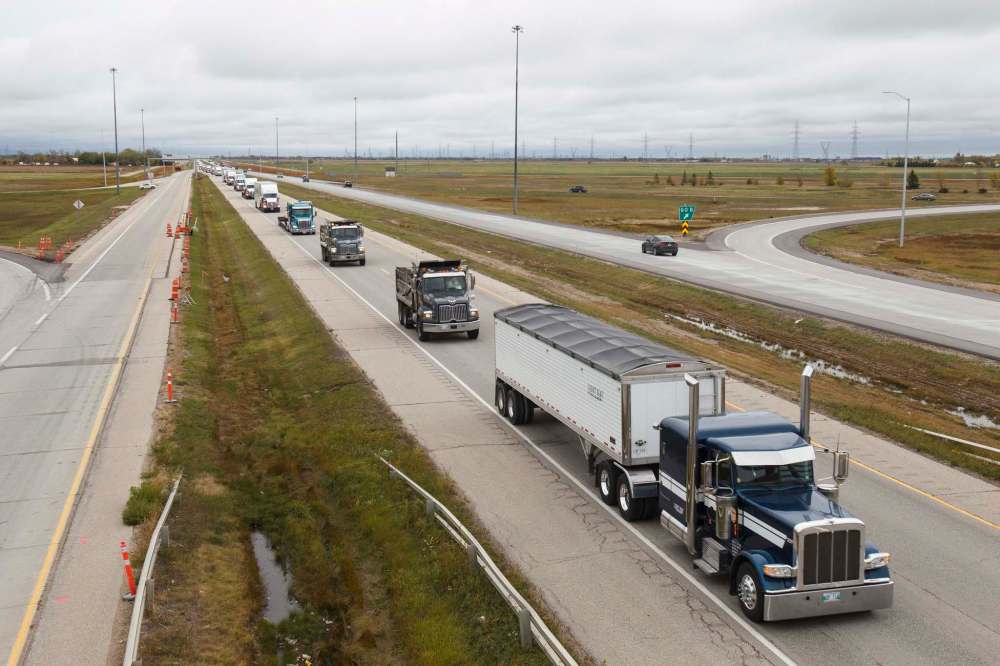Manitoba business, agriculture groups voice concerns over carbon-tax uncertainty
Advertisement
Read this article for free:
or
Already have an account? Log in here »
To continue reading, please subscribe:
Monthly Digital Subscription
$0 for the first 4 weeks*
- Enjoy unlimited reading on winnipegfreepress.com
- Read the E-Edition, our digital replica newspaper
- Access News Break, our award-winning app
- Play interactive puzzles
*No charge for 4 weeks then price increases to the regular rate of $19.00 plus GST every four weeks. Offer available to new and qualified returning subscribers only. Cancel any time.
Monthly Digital Subscription
$4.75/week*
- Enjoy unlimited reading on winnipegfreepress.com
- Read the E-Edition, our digital replica newspaper
- Access News Break, our award-winning app
- Play interactive puzzles
*Billed as $19 plus GST every four weeks. Cancel any time.
To continue reading, please subscribe:
Add Free Press access to your Brandon Sun subscription for only an additional
$1 for the first 4 weeks*
*Your next subscription payment will increase by $1.00 and you will be charged $16.99 plus GST for four weeks. After four weeks, your payment will increase to $23.99 plus GST every four weeks.
Read unlimited articles for free today:
or
Already have an account? Log in here »
Hey there, time traveller!
This article was published 05/10/2018 (2630 days ago), so information in it may no longer be current.
The provincial government’s decision to abandon its proposed carbon tax has created greater uncertainty in the Manitoba business community than there was a week ago.
While some business leaders breathed a sigh of relief that the province’s $25-a-tonne carbon levy would be scrapped, many had supported the Manitoba plan over Ottawa’s, which would see the tax rate climb to $50 a tonne in a few years.
Under Manitoba’s Climate and Green Plan, the province had exempted farmers from paying the carbon tax on farm fuels, including those used for drying grain or heating barns.

Farmers have received no assurances they’ll receive the same exemptions from Ottawa, which plans to impose a $20-a-tonne carbon tax on Jan. 1 in provinces that have not implemented their own tax. Manitoba’s plan was to take effect Dec. 1.
Bill Campbell, president of Keystone Agricultural Producers, said farmers are “in limbo now,” not knowing how a growing rift between Ottawa and a growing number of provinces opposed to the carbon tax is going to play out.
“Now, we don’t know where we’re at in this whole process,” he said Friday.
Loren Remillard, president of the Winnipeg Chamber of Commerce, said given the choice of the flat $25-a-tonne flat tax proposed by the province and a federal tax climbing to $50, business chose the provincial plan.
The chamber is disappointed that Ottawa was not prepared to allow Manitoba to show that its tax model was more effective in reducing greenhouse gas emissions, as the province claimed, he said.
“We preferred the Manitoba approach because it created a little more (cost) certainty,” Remillard said Friday.
But he said he also respects Premier Brian Pallister’s decision to take a stand now against Ottawa’s insistence on an escalating carbon tax, noting that the federal tax would rise to $30 in a little over a year.
“If it’s a choice between Ottawa’s imposition (of a higher tax) or Manitoba pushing back, we support the province in pushing back,” Remillard said.

For the trucking industry, there was relief this week that the province was abandoning its tax plan. Manitoba truckers and heavy-equipment operators faced a combined cost increase of $1 million a week from provincial carbon tax. So, there’s been a temporary reprieve until a federally imposed tax takes effect.
Terry Shaw, executive director of the Manitoba Trucking Association, disagrees with some in the business community that the provincial plan offered more cost certainty than Ottawa’s. In the long-term, there was never any guarantee that Ottawa would have allowed Manitoba to maintain its flat tax rate, he said.
“There’s certainty (in Ottawa’s carbon tax regime), it’s just bad certainty,” Shaw said.
The trucking industry is especially vulnerable to a carbon tax, operating in a competitive market with no corresponding tax south of the border. Unlike individuals, trucking companies cannot reduce their carbon footprint simply by buying a more fuel-efficient vehicle or choosing to take a bus or ride a bike to work, he said, adding companies are already investing in modern trucks and more efficient tires to reduce fuel costs.
Manitoba’s manufacturers say they are also disproportionately affected by a carbon tax.
Ron Koslowsky, Manitoba vice-president with Canadian Manufacturers & Exporters, said companies are always trying to reduce their energy costs. Given some financial breathing room, they’ll make the necessary investments, but that becomes more difficult when their costs go up as a result of increased taxes.
“You’re actually defeating the very goal of helping manufacturers invest in the thing that will make a difference (in controlling greenhouse gases),” he said.

Meanwhile, farm and business leaders are eyeing the growing divide between Ottawa and the provinces on the carbon tax issue with interest.
With the election of Doug Ford’s Conservatives, Ontario is now staunchly opposed to a carbon tax, as is Saskatchewan. Alberta Premier Rachel Notley is refusing to raise her province’s carbon tax in line with federal requirements now that the Trans Mountain pipeline project is stalled. Manitoba is now threatening to challenge the federal carbon tax in court.
“We can expect some very difficult conversations between provincial governments and the federal government in the months ahead leading up to the (2019 federal) election,” Remillard said.
larry.kusch@freepress.mb.ca

Our newsroom depends on a growing audience of readers to power our journalism. If you are not a paid reader, please consider becoming a subscriber.
Our newsroom depends on its audience of readers to power our journalism. Thank you for your support.




